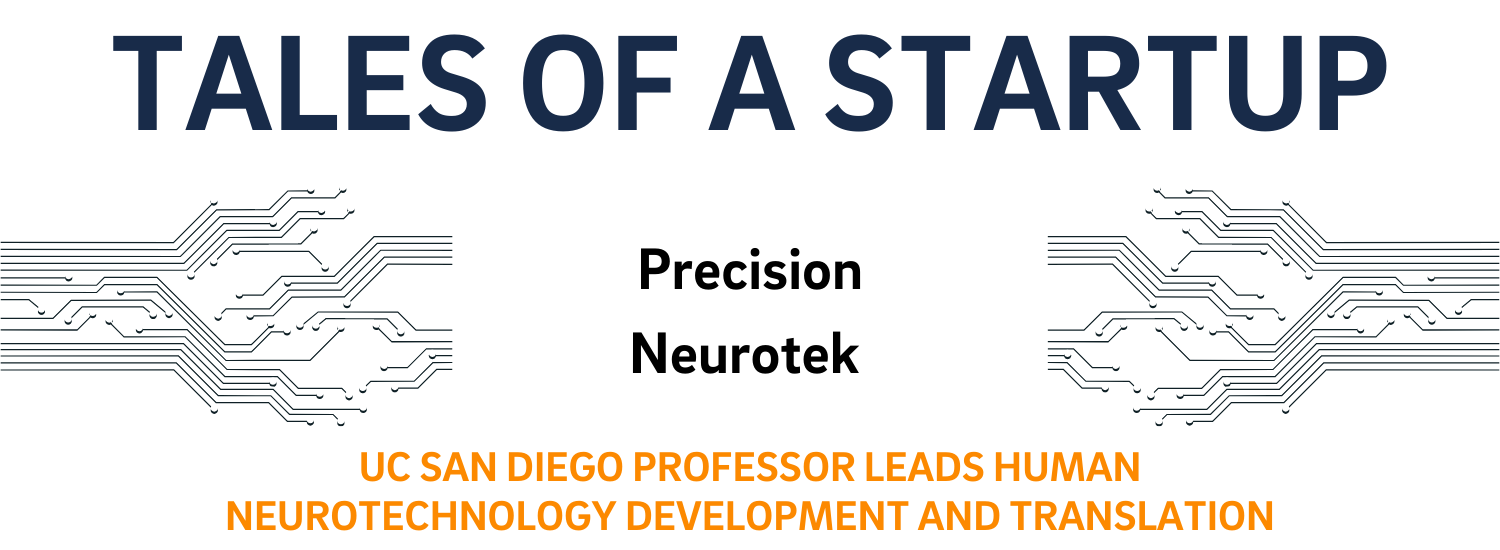
UC San Diego Professor Leads Human Neurotechnology Development and Translation
October 20, 2021
One of the world’s top investigators in electronic materials, UC San Diego’s Professor Shadi Dayeh is pioneering the development of translational neurotechnologies that change the way we understand and treat the human nervous system.
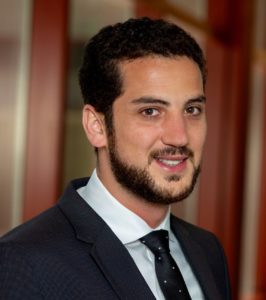 Dayeh, whose graduate work at UC San Diego has received awards and a star postdoctoral fellow at Los Alamos National Laboratory, found at UC San Diego a rich environment for biomedical and biotechnology development and translation. He fostered collaborative efforts across engineering and medicine to launch a clinical translational program in his Integrated Electronics and Biointerfaces Laboratory (IEBL) that uses the latest advances in semiconductor technology for biomedical devices.
Dayeh, whose graduate work at UC San Diego has received awards and a star postdoctoral fellow at Los Alamos National Laboratory, found at UC San Diego a rich environment for biomedical and biotechnology development and translation. He fostered collaborative efforts across engineering and medicine to launch a clinical translational program in his Integrated Electronics and Biointerfaces Laboratory (IEBL) that uses the latest advances in semiconductor technology for biomedical devices.
The maturity of his lab’s efforts has garnered support from government agencies and local centers and donors, the trust of clinical collaborators and patients, and the credibility to launch startups to take IEBL’s technologies from the lab to the bedside. These include Precision Neurotek Inc that develops neuromonitoring grids for use during neurosurgical resection in the brain and spinal cord, and FeelTheTouch LLC that develops high resolution shear sensors to close the loop in robotic gripping.
Read more on his journey from lab to market below.
What has been your experience with UC San Diego and its diverse entrepreneurial culture?
It is both inspiring and energizing to see the diverse entrepreneurial culture at UC San Diego which when coupled with the geographical proximity and intellectual synergies between engineering and medicine make fertile ground for impactful partnerships. At the department level, extensive collaborations through centers and research initiatives have propelled innovations and provided support for multidisciplinary research. At the campus level, I was lucky to participate in the Accelerating Innovations to Market (AIM) program which provided us funds to scale our research and to obtain results that could qualify us for external funding in addition to numerous seed grant initiatives.
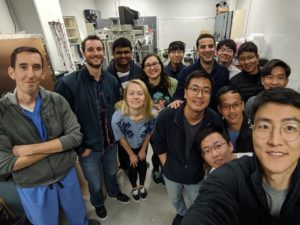
“More than physical and infrastructure resources, the mentoring and guidance offered by the program and by OIC throughout the years has been phenomenal.”
But more than physical and infrastructure resources, the mentoring and guidance offered by the program and by OIC throughout the years has been phenomenal. This included stewarding engagements within and outside the UC San Diego ecosystem, developing strategies for IP profile for technologies, and often offering critical feedback on development plans for translation. Overall, my experience has been very positive, and I am grateful to be part of this entrepreneurial culture at UC San Diego.
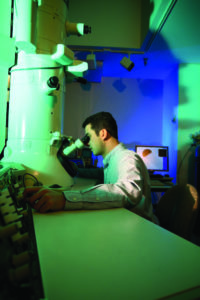 What excites you about your work?
What excites you about your work?
Growing up, I was inspired by Kahlil Gibran’s quote “Work is love made visible” and since then, I try to shape my work to be an expression of who I could be. Creativity in science and engineering is no less than creativity in the arts and in some sense, we establish a special bond with the questions we pursue and the problems we tackle to arrive at solutions. Excitement comes in different ways. On one hand, the reward of solving problems that utilize our learned experiences and earned skills is meaningful and this reward grows as we learn and practice more. On the other hand, the reward of seeing impact on the society is a direct measure of our success in solving problems, and this magnifies the fact that problem selection is a critical factor in determining the impact of one’s career.
“Growing up, I was inspired by Kahlil Gibran’s quote “Work is love made visible” and since then, I try to shape my work to be an expression of who I could be.”
While we cannot freely select the problems to work on, we can work on being prepared and always learning until the opportunity comes. I’ve been fortunate to find excellent collaborators to work together on exciting problems both in medical devices and in electronics and sensors. These collaborations led to a major recent clinical translational award from the National Institutes of Health (NIH) and to incubating two startups in 2020, Precision Neurotek Inc that develops neuromonitoring grids for use during neurosurgical resection in the brain and spinal cord, and FeelTheTouch LLC that develops high resolution shear sensors to close the loop in robotic gripping. The most excitement comes from seeing my mentees evolve and go on to forge their own path to impact and success.
Describe a typical day in Startupland. What does your day look like?
My startup efforts are newly evolving with weekly meetings and planning with stakeholders; I can describe my typical day in the lab that I lead at UC San Diego, the Integrated Electronics and Biointerfaces Laboratory. My day starts with a daily 9 a.m. meeting where the team coordinates the daily tasks, provides updates on progress, and takes into account any incidents related to the equipment we use. This has become an important part of our operation to keep the efforts in the proper perspective.
The majority of my time is spent with my research team, with my collaborators, and almost 60% of my time is dedicated to writing numerous grants. Success rates are usually 5-10%, so it means that I need to submit at least 10 proposals to nearly get one funded! It also means that one needs to develop a robust mechanism to deal with frequent failures and disappointments.
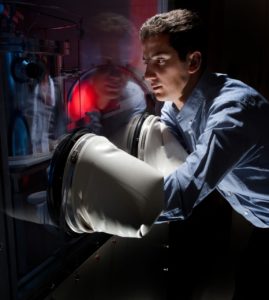 How do you define innovation in the 21st Century?
How do you define innovation in the 21st Century?
Innovation in the 21st century is utilizing one’s specialized expertise or mastery in a single domain to address a timely problem on a fundamental level. To gain specialized expertise, the University campus plays a critical role in training and preparation in addition to the skills that one can acquire through consistent and focused practice, whether experimenting within or outside the campus laboratories. The endurance and range of impact of innovations cultivated in this manner can be long lasting.
“One should aim to be the best craftsman in their own discipline and then make the leap to apply their skills to solve problems in other disciplines.”
At a time where we have exponential advances in individual or combined fields of science, new multidisciplinary skills are essential for any entrepreneur without diluting the depth in one’s main discipline. This is to say that one should aim to be the best craftsman in their own discipline and then make the leap to apply their skills to solve problems in other disciplines: I cannot see a sustained success in doing this in any other way.
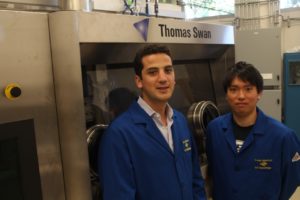 What role have mentors played in your success/journey?
What role have mentors played in your success/journey?
My mentors are the pillars of my success, they have been the sound of reason and the source of wisdom especially when cold winds blew, an
d they have also been true role models in their work and professional conduct and in their genuine personal interactions. My formal mentors and colleagues have been generous with their time and insight, and I learn from all my colleagues, my students, and those who I come across in my daily life.
I learned from my first mentor, my mother, to approach life with love and humility and to try to learn from every experience and every interaction: She is certainly my top mentor. However, it is important to note that every one of us has a unique life path and none of us will live the lives of our mentors, so we must truly learn from life itself and evolve in the process. This does require positivity, hard work, resilience, self-control and endurance and the tougher the life experiences are, the better the one comes out at the end if one endures to survive and keep on attempting to succeed.
What are some of the biggest challenges you faced in the startup process? How were you able to overcome them?
It is important to take calculated risks at the right time; I cannot tell if launching the startups earlier would have been beneficial, especially because the area of neurotech has been truly exploding. Doing startups in these domains is a risk in itself but I believe that I have clarity on my goals and on what’s important in the field, and at this moment of time, I am superbly prepared to accomplish these goals.
What advice would you give to a UC San Diego student thinking about starting a company?
The typical ingredients for success in a startup are properly addressed in programs that OIC offers, and there are a lot of resources that students can tap into here at UC San Diego. UC San Diego is truly a hybrid innovation engine for multidisciplinary and impactful problems and all of us faculty, students, and staff, benefit and contribute to the work involved with that journey. Every startup story is unique and is the result of several factors.
“UC San Diego is truly a hybrid innovation engine for multidisciplinary and impactful problems and all of us faculty, students, and staff, benefit and contribute to the work involved with that journey.”
I would advise the students to carefully consider the statement of needs that their innovations would address and to reflect on the impact of the work and whether that impact aligns well with the core mission of their professional career and in some sense, life purpose. If this is satisfied, the resources will naturally align to succeed.
To learn more about Precision Neurotek Inc and FeelTheToch LLC, email Shadi at sdayeh@eng.ucsd.edu